|
|
|
Sort Order |
|
|
|
Items / Page
|
|
|
|
|
|
|
| Srl | Item |
| 1 |
ID:
137376
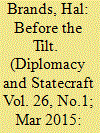

|
|
|
|
|
| Summary/Abstract |
Scholars have detailed the American “tilt” toward Iraq during the 1980s. There is, however, an important pre-history to this relationship, which has only emerged with the release of new American and Iraqi documents. American overtures to Saddam Hussein originated not under Reagan, but under his predecessor. From early in his presidency, Jimmy Carter sought to engage Iraq in hopes of moderating the Baathist regime and fortifying America’s position in the Persian Gulf and broader Middle East. Though this diplomacy ultimately proved unsuccessful, this episode has implications for the study of Carter’s foreign policy and the evolution of American–Iraqi relations.
|
|
|
|
|
|
|
|
|
|
|
|
|
|
|
|
| 2 |
ID:
124191
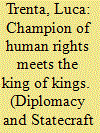

|
|
|
|
|
| Publication |
2013.
|
| Summary/Abstract |
Building on the recent re-discovery of the Iranian Revolution, this analysis examines the policies of the Carter Administration and their effects on Iran and the Iranian opposition. Starting with Jimmy Carter's election and hopes for a new era in American-Iranian relations, there occurred the progressive creation and expansion of a rift between the Carter Administration and the Iranian opposition. This rift was exacerbated by stubborn American support for an increasingly weak Shah, and by the complete unwillingness, both in Washington and at the American Embassy in Tehran, to meet with opposition members, let alone with Ayatollah Ruhollah Khomeini. In this sense, the horizon of the analysis of the origins of the Iran hostage crisis is expanded with a longer-term perspective. The taking of the hostages represented the final act of a troubled relationship that had probably begun before Carter took office.
|
|
|
|
|
|
|
|
|
|
|
|
|
|
|
|
| 3 |
ID:
095407
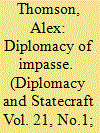

|
|
|
|
|
| Publication |
2010.
|
| Summary/Abstract |
This article seeks to explain the diplomatic impasse that developed between the United States and South Africa during later 1970s. Although the Carter Administration's foreign policy towards Pretoria was more confrontational than its predecessors, it failed to bring South Africa to account over apartheid. The critical rhetoric and diplomatic symbolism used against the Republic was intensified, yet Carter continued to reject the use of punitive economic sanctions. Instead, the United States supported the notion of an international corporate presence in the Republic, regarding such business contacts as a force for change. It is argued that this dichotomy between a short-term strategy of confrontation and a longer-term strategy of continued economic engagement ultimately undermined Carter's South Africa policy. Exploiting the contradictory and confused signals emanating from Washington DC, the Republic's government chose to simply weather Carter's political storm, and a diplomatic stalemate ensued.
|
|
|
|
|
|
|
|
|
|
|
|
|
|
|
|
| 4 |
ID:
121170
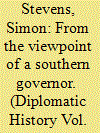

|
|
|
|
|
| Publication |
2012.
|
| Summary/Abstract |
The Carter administration's adoption of an approach towards the South African government's policy of apartheid that was, as Jimmy Carter put it, "correct but as easy on them as possible," cannot be explained solely by American economic and strategic interests in the region or by the administration's desire for South Africa's cooperation on nuclear nonproliferation and the resolution of the conflicts in neighboring Rhodesia and Namibia. The lessons Carter and Ambassador to the United Nations Andrew Young drew from their earlier personal experiences in the American South in the 1960s were also of great significance. Those experiences not only gave Carter and Young a strong commitment to ending apartheid in South Africa but also strongly influenced the ways in which they thought that objective might be achieved. First, Carter and Young had considerable sympathy for the position of white South Africans and were concerned to work with them toward peaceful change in a spirit of cooperation rather than confrontation. Second, they believed that American businesses could have a positive impact on race relations in South Africa. They therefore encouraged American investors to adopt "enlightened employment practices," and resisted pressure from anti-apartheid activists to impose economic sanctions.
|
|
|
|
|
|
|
|
|
|
|
|
|
|
|
|
| 5 |
ID:
179023
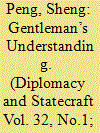

|
|
|
|
|
| Summary/Abstract |
British, French, and German Dual-Use Technology Transfer to China and America’s Dilemma during the Carter Administration, 1977-1981
|
|
|
|
|
|
|
|
|
|
|
|
|
|
|
|
| 6 |
ID:
139161
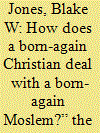

|
|
|
|
|
| Summary/Abstract |
The Iranian hostage crisis remains as one of the dominant memories from the presidency of Jimmy Carter. While scholars and journalists have devoted considerable attention to the administration's response to the crisis, no one has focused on the religious dimension of the hostage crisis. Drawing extensively on the archival records of the Jimmy Carter Presidential Library, this study argues that American and Iranian perceptions of the other's religion complicated a conflict already fraught with sacred symbolism. While the Iranians castigated Carter for insincerely professing his faith, the president's foreign policy advisors underestimated the role of religion in the new Iranian regime and how it might be used to bring the hostages home. The hostages finally came home when the United States negotiated with Iran's religious leaders and those leaders no longer had any political use for the hostages. Ultimately, this essay contributes to the relatively small literature analyzing the foreign relations of the Carter administration through a religious lens.
|
|
|
|
|
|
|
|
|
|
|
|
|
|
|
|
| 7 |
ID:
111567
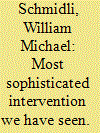

|
|
|
|
|
| Publication |
2012.
|
| Summary/Abstract |
In May 1977, in a public forum, President Jimmy Carter laid out the foundations of a distinctive foreign policy programme for the United States. He offered a striking shift away from the Cold War realpolitik of previous American administrations. Human rights, he declared, would be a central component of United States foreign policy. The growing instability in Central America, especially in Nicaragua, during Carter's term of office provided a major test of his Administration's new programme. And its ultimate response to Nicaraguan instability thus provides key insight into the strengths and weaknesses of the thirty-ninth President's attempt to move beyond traditional, hard-line Cold War diplomacy.
|
|
|
|
|
|
|
|
|
|
|
|
|
|
|
|
|
|
|
|
|